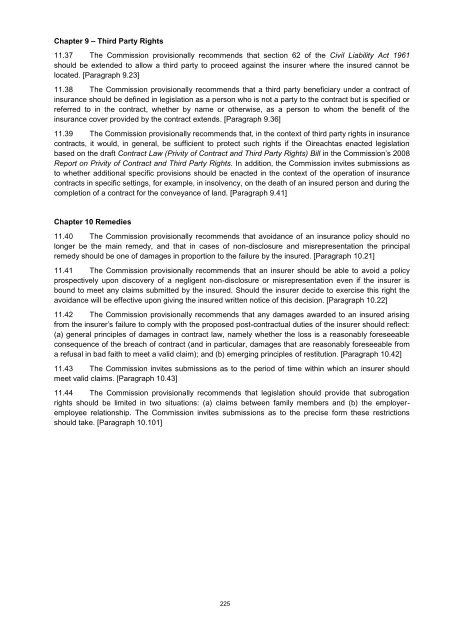Insurance Contracts CP - Law Reform Commission
Insurance Contracts CP - Law Reform Commission
Insurance Contracts CP - Law Reform Commission
You also want an ePaper? Increase the reach of your titles
YUMPU automatically turns print PDFs into web optimized ePapers that Google loves.
Chapter 9 – Third Party Rights<br />
11.37 The <strong>Commission</strong> provisionally recommends that section 62 of the Civil Liability Act 1961<br />
should be extended to allow a third party to proceed against the insurer where the insured cannot be<br />
located. [Paragraph 9.23]<br />
11.38 The <strong>Commission</strong> provisionally recommends that a third party beneficiary under a contract of<br />
insurance should be defined in legislation as a person who is not a party to the contract but is specified or<br />
referred to in the contract, whether by name or otherwise, as a person to whom the benefit of the<br />
insurance cover provided by the contract extends. [Paragraph 9.36]<br />
11.39 The <strong>Commission</strong> provisionally recommends that, in the context of third party rights in insurance<br />
contracts, it would, in general, be sufficient to protect such rights if the Oireachtas enacted legislation<br />
based on the draft Contract <strong>Law</strong> (Privity of Contract and Third Party Rights) Bill in the <strong>Commission</strong>‘s 2008<br />
Report on Privity of Contract and Third Party Rights. In addition, the <strong>Commission</strong> invites submissions as<br />
to whether additional specific provisions should be enacted in the context of the operation of insurance<br />
contracts in specific settings, for example, in insolvency, on the death of an insured person and during the<br />
completion of a contract for the conveyance of land. [Paragraph 9.41]<br />
Chapter 10 Remedies<br />
11.40 The <strong>Commission</strong> provisionally recommends that avoidance of an insurance policy should no<br />
longer be the main remedy, and that in cases of non-disclosure and misrepresentation the principal<br />
remedy should be one of damages in proportion to the failure by the insured. [Paragraph 10.21]<br />
11.41 The <strong>Commission</strong> provisionally recommends that an insurer should be able to avoid a policy<br />
prospectively upon discovery of a negligent non-disclosure or misrepresentation even if the insurer is<br />
bound to meet any claims submitted by the insured. Should the insurer decide to exercise this right the<br />
avoidance will be effective upon giving the insured written notice of this decision. [Paragraph 10.22]<br />
11.42 The <strong>Commission</strong> provisionally recommends that any damages awarded to an insured arising<br />
from the insurer‘s failure to comply with the proposed post-contractual duties of the insurer should reflect:<br />
(a) general principles of damages in contract law, namely whether the loss is a reasonably foreseeable<br />
consequence of the breach of contract (and in particular, damages that are reasonably foreseeable from<br />
a refusal in bad faith to meet a valid claim); and (b) emerging principles of restitution. [Paragraph 10.42]<br />
11.43 The <strong>Commission</strong> invites submissions as to the period of time within which an insurer should<br />
meet valid claims. [Paragraph 10.43]<br />
11.44 The <strong>Commission</strong> provisionally recommends that legislation should provide that subrogation<br />
rights should be limited in two situations: (a) claims between family members and (b) the employeremployee<br />
relationship. The <strong>Commission</strong> invites submissions as to the precise form these restrictions<br />
should take. [Paragraph 10.101]<br />
225

















